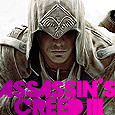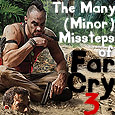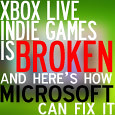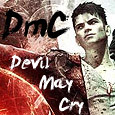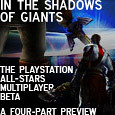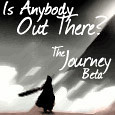
NOTE: Sorry for missing my usual Sunday "In The News" post deadline (today's Monday). To make up for it, I'll supersize it:
On The Cusp Of A Price War
It looks as though we're going to have one hell of a holiday season this year folks. According to analysts, Microsoft will lower all the 360's SKU's prices by $50 and Sony to respond in kind, dropping the PS3 to $500, the PS2 to $99, and the PSP gets a redesign. This should be quite a thing to watch. A price war is certainly good for we as consumers- the less money spent on the initial investment (the console), the more money we have to justify the purchase (games). But for the hardware manufacturers (mostly Sony though), this could really hurt them, at least in the short term.
But can a $100 price drop really help Sony out that much? The PS3 will still be a hearty $500. They'll just have to grin and bear it and hope that that PS2 $99 "magic" price point and potentially renewed PSP interest can keep them afloat until the hardware gets cheap enough. However, other analysts are saying that any price cut Sony can realistically introduce will be "
too little, too late." Is that true though?
I mean, Sony's plan from the get-go with the PS3 has been "long-term" while Microsoft and Nintendo have both been thinking about "short-term." Will Sony's strategy really be able to pay off? We see that the PS2 is still doing magnificent seven years later, consistently selling about 180,000 units per month, and always outselling the XBOX 360. That's got to make Sony feel good. And certainly the PS3 has more legs than the PS2
had has. The problem is that those legs are just taking a little while to sprout, and when people buy a $600 game console, they want that thing to rival a millipede in terms of legs. That's the reason that the PS3 has had such a slow start.
But what about the PSP? Can a redesign really save it? Does it even need saving? Remember, the PSP (in the USA) pretty much consistently
outsold the DS for two years until the DS Lite was introduced and the PSP was left in the dust. Following that logic, giving the PSP a brighter screen, better battery life, a hard drive, a more refined D-Pad and Analog Nub (or even a second nub), a new type of plastic to stop rampant fingerprinting (like the Zune), another price cut from the current $169.99 to maybe around $139.99 (reasonable, I'd say), and a lot more worthwhile original games along the lines of God of War: Chains of Olympus, Exit, Lumines, Wipeout Pure, GTA:LC/VC, etc and you'll see a PSP renaissance taking place.
Let's just hope that Sony's late-2007/early-2008 lineup of amazing software and potential price cuts can help them beat back the ravaging success of the Wii and (to a lesser extent) XBOX 360.
Nudity the Cause for Halo 2 Vista Delay
Wow. One of the funniest
error messages around is in the Halo 2 Vista edition, and it warrants a delay for the entire game. The only time you can get this error message is in the map maker (a feature most gamers aren't going to use that often) and somehow get the .ASS error, which seems like just a little joke one of the developers put in there. Honestly, why is this such a big deal? First of all, this is not an error message that will rear its ugly head (that deserves an "lol") pretty much
ever, so who is this going to hurt? Second, it's just a guy mooning you. That's funny. In a Mature-rated game, that's funny. I could understand if we were talking about this kind of thing in Barbie's Horse Adventure or whatever, but let's face it. The ESRB is clear that this game is for 17+ gamers ONLY. Developers shouldn't have to worry about making their M-rated game appropriate for all audiences.
And finally, it's an ass. So what? Why does society say it's okay to shoot somebody in the face until they die and have blood spilling out, but it's over the line if you curse or show skin? (Tangent)Curse words are just words with stronger meanings. We need to get over the "stigma" of curse words in society.(/Tangent) In addition, we need to get over our outright fear of nudity. What's an ass really, anyway? It's just more skin with more fat with a crack down the center. That's like looking at a fat guy's back folds only he can't poop out of them. This paragraph has been more like a vent against society, so I'll get more on topic now.
You'd think that after the
Hot Coffee madness and the equally infuriating
Oblivion fiasco, the ESRB (and game industry in general) would have learned from the experience. Microsoft took the correct route in dealing with this, I suppose, but the principle of it all is just
messed up.
Why Work Is Looking More Like a Video Game
-(If you don't have/want a NY Times account, go here.)- Michael Fitzgerald of the New York Times just recently wrote an article about why boring work activities are becoming (and should become) more like video games. It's actually a pretty interesting read and shows you the practical use of video games in real life and the workplace. God knows it would have made my time as a Target cashier more bearable if there was more of a video game aspect to it than "keep your speed above 88 or get fired." Had there been some sort of reward or even an interesting combo system (or better yet, a leaderboard) to keep cashiers occupied, motivated, and competitive with our scores, it would have made all the difference. My job wouldn't have just been this unbearably boring and even annoying task, it could have been
fun.
Of course, games in the workplace are going to be far in the future at this point since gaming really is still in its infant years and still discovering just what exactly it means to be a video game. As the article mentioned, we aren't going to be seeing anything along the lines of Zelda, probably ever, but who says that those fully-fledged games can't be used for business? Every World of Warcraft fan is quick to point out how popular conducting business meetings from around the world seems to be in-game, so why aren't more online games being used for this very purpose? The most obvious reason is that most online games, like first-person shooters, require a good amount of attention, so these wouldn't be the most productive meetings. More casual games like WoW or perhaps Texas Hold'em Poker that don't require as many mental reserves would be more fit for "business-but-fun" meetings.
However, meetings aren't the only thing video games would be good at. I already mentioned having a more video game-esque atmosphere in a cashier setting, but what other kinds of jobs could benefit from this type of video game mixture? A job that requires a lot of typing could benefit from a very casual music experience, where certain keys (or words) make certain ambient noises, allowing for a much more engaging (and relaxing) environment for typing jobs. Factory workers in assembly lines could enjoy a more interesting environment if while they were putting together items and such, they were involved in a kind of rhythm game.
Again, this is all in the future. Right now, we simply don't have the societal influence or the technology to really implement some of these innovations. Hopefully within my lifetime we'll get to it.
Valve Keeping Downloadable Content Free
Slow clap for Robin Walker, people: "You buy the product, you get the content," he said. "We make more money because more people buy it, not because we try and nickel-and-dime the same customers." Tell that to Electronic Arts, please, who are notorious for charging for things on current-gen systems that are free in last-gen versions of their games. Thank goodness we've got a couple developers looking out for us as consumers. Valve not only talks the talk, but they walk the walk: They've committed to bringing any additional content for Half-Life 2, Team Fortress 2, and Portal, on ANY system, out for free. They claim that the extra content helps spur new sales of the original game, leading to more money earned than if they charged everybody for that additional content.
Not only that, but Valve is also the developer bringing a staggering five game pack (Half-Life: The Orange Box) that includes Half-Life 2, HL2: Ep.1, HL2: Ep.2, Team Fortress 2, and Portal all for the standard "next-gen" game price of $60. Valve is absolutely a revolutionary in terms of trend-setting. Not only did they popularize digital distribution with their Steam service, but it seems that now they want to show the game world what good customer service really is.
Now, I understand why there might be some opposition from publishers, developers, and even the hardware manufacturer to things like this. Microsoft already protested Epic Games' insistence on releasing additional Gears of War content for free, eventually forcing them to follow a Halo 2 model (pay now, free later). Even if I don't like it, I get why Microsoft did that. They want the XBOX Live
Marketplace to be mostly full of content that costs money. They get money from it, and so does the publisher/developer. Therefore, they need people to expect to have to
buy things from the
Marketplace. Again, I completely understand that, just as I understand that this content costs money to produce. However, as Valve is proving, as much (or more) money can be made from free content.
But seriously, though, kudos to Valve. Here's to hoping that the Orange Box becomes the world's best selling video game (compilation).
WEEKLY SAMPLER: PSN 1.5M /
2008 Wii Shortages? /
DRM Surrender? /
Big 3 2007 /
Jackass /
Mega Man vs. Halo!



























